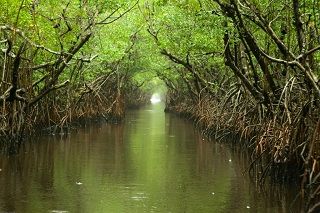2GreenEnergy Intern Poses Questions on Organic Food, Climate Disruption

Hello Mr. Shields. I had a question for you that I thought was interesting. It’s not completely about energy efficiency in a business but it does have to do with the environmental issues many of those companies face. The organic food movement is huge right now and I wanted to get your stance on something. The organic food industry makes its money by stating the fact that their food is grown pesticide free and not tainted, basically. However, how organic can food really be when our soil has such a legacy of pesticides ingrained in it already and when not one place on earth, where these foods are grown, is probably completely void of pollutants? I just thought it was interesting because we put so much emphasis and we are willing to spend so much extra money on food deemed organic, yet how organic can something be in today’s world?
Also, I had one more point dealing with states restoring or conserving natural areas. In Florida, the everglades (pictured) are always a source of debate with conservation and restoration. My question is: are the everglades worth restoring when the rise in sea level, due to global warming, will put the everglades underwater within the foreseeable future. Would the state’s money be better spent on improving environmental conditions rather than saving this area that will most likely be lost anyway? Thanks!
I respond:
Nice to hear from you!
Re: your first question, you’re absolutely right that there is no place on the planet that is free of chemicals. We’re finding PCBs in the arctic. This is a point that Bill McKibben makes so well in his masterpiece “Eaarth,” i.e., that we’ve forever changed the planet we used to have. Thus, to say that food is “organic” is not to say that it’s 100% free of pesticides. It’s a relative term, and the exact definition is open to debate, which, as you can imagine, gets quite heated. Food companies generally want to dilute the definition of the word so they can legally call more of their products “organic,” where consumer advocacy groups call for stricter standards.
Re: your second question, I’m not sure there is a definitive answer; I certainly don’t have one. Having said that, I believe strongly that government, especially at the federal level, should be investing heavily to deal with climate disruption and the numerous other environmental catastrophes that are unfolding around us, e.g., ocean acidification, loss of biodiversity, lung damage, etc. Here are the high-level actions I would take in terms of economics:
• Repeal subsidies for fossil fuels
• Establish financial incentives for carbon reduction
• Invest heavily on R&D for clean/low-carbon energy, especially renewables and advanced nuclear, as well as the peripheral issues that support all this: electricity transmission, smart grid, energy storage, efficiency, conservation, and electric transportation
• Continue to explore options in geo-engineering, to deal with worst-case scenarios
If the U.S. takes the actions above, we will be in a position to lead the way toward multi-national treaties, as we will have taken the moral high-ground on the issues.
Again, great hearing from you.
